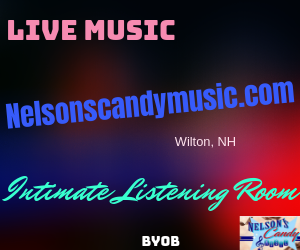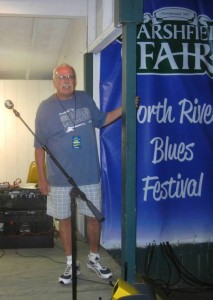 John Hall is a very busy man this time of year. Hall is the creator and director of the hugely popular Green Harbor Roots Festival and North River Blues Festival at The Marshfield Fair. It runs the third and fourth weekend of August. Hall has quite a story to tell about his festival, the history behind it, and his multitude of other jobs, past and present, in the local music industry.
John Hall is a very busy man this time of year. Hall is the creator and director of the hugely popular Green Harbor Roots Festival and North River Blues Festival at The Marshfield Fair. It runs the third and fourth weekend of August. Hall has quite a story to tell about his festival, the history behind it, and his multitude of other jobs, past and present, in the local music industry.
Hall was prompted to start the North River Blues Festival at Marshfield Fair 19 years ago because he had two CD stores that he needed to promote. In 1998, he closed one store that he had in Plymouth but kept one open in Marshfield until 2003 when he closed that one as well. That was when computers started including CD burners and download apparatus that made his bricks and mortar retail business obsolete in the eyes of young Top 40 fans.
He initially called his new event Rhythm Room Records presents the North River Blues Festival at the Marshfield Fair. Hall had convinced the Fair directors in a letter about his idea to have a blues festival at the Marshfield Fair.
“I explained to them that having a blues festival at a fair was really a natural fit,” he said. “The Marshfield Fair has been going on for 147 years, and for all those years they had some sort of entertainment, bands. In the south, a lot of these fairs had minstrel shows. So to have blues music at an agricultural fair is a natural fit. Maybe the Marshfield Fair in 1869 didn’t have Delta blues players there, but it was certainly that way in the south.”
Susan Tedeschi was part of the line up for the first festival in 1995. She was paid $800.00. Today, a booker cannot even approach Tedeschi unless he’s offering $20,000.00.
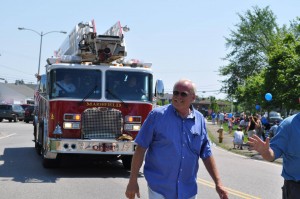 Hall presents two different festivals within the ten days the fair runs. One is the Green Harbor Roots Festival which will run the first weekend, Saturday, August 16, and Sunday, August 17. (Saturday will feature Albert Lee, Girls, Guns & Glory, Juliet & The Lonesome Romeos, Roy Sludge Trio, Highway Ghosts, with Vegas Valentinos on the side stage.) (Sunday will feature Southern Hospitality, Sarah Potenza, Entrain, Blind Ambition, Voo Doo Blues, with The Rampage Trio on the side stage).
Hall presents two different festivals within the ten days the fair runs. One is the Green Harbor Roots Festival which will run the first weekend, Saturday, August 16, and Sunday, August 17. (Saturday will feature Albert Lee, Girls, Guns & Glory, Juliet & The Lonesome Romeos, Roy Sludge Trio, Highway Ghosts, with Vegas Valentinos on the side stage.) (Sunday will feature Southern Hospitality, Sarah Potenza, Entrain, Blind Ambition, Voo Doo Blues, with The Rampage Trio on the side stage).
The second festival, on August 23 and August 24 is the North River Blues Festival. (Saturday will feature Golden State – :Lone Star Review, Rick Estrin & The Nightcats, Delta Generators, Travis Colby, Jim Perry’s Hothouse, with Tim Gartland Group on the side stage). (Sunday will feature Tramped Under Foot, 2 Sugars & The Bluetones, Diane Blue & Lydia Warren, Throw Down Band, Junk Yard Dogs, with Basic Black featuring Sam Gentile on the side stage).
When asked why he runs two separate festivals in a brief time period, Hall quipped “Because I do a good job.” The North River Blues Festival came first. He actually started the Green Harbor Roots Festival, a year later, after a cover band friend of his, from a band call The Infractions, pleaded with him to get into the blues festival. Although they were a good cover band, they were a cover band none the less, and wouldn’t go over at a blues festival.
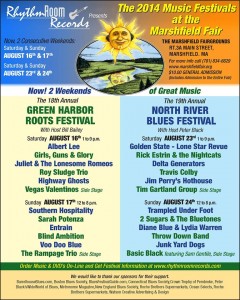 “I was like ‘Yikes. I can’t do that and be true to he music,” Hall said. “So, I started another festival where I throw all different kinds of music in, as reflected in this year’s festival. Southern Hospital are playing a lot of blues festivals, but I would call them a roots New Orleans southern band as much as a blues band. And Sarah is more of a roots artist than a blue artist. And Entrain is a jam band. I also have Blind Ambition and Voo Doo Blue, which are classic rock bands. Voo Doo Blue is a local Marshfield band.”
“I was like ‘Yikes. I can’t do that and be true to he music,” Hall said. “So, I started another festival where I throw all different kinds of music in, as reflected in this year’s festival. Southern Hospital are playing a lot of blues festivals, but I would call them a roots New Orleans southern band as much as a blues band. And Sarah is more of a roots artist than a blue artist. And Entrain is a jam band. I also have Blind Ambition and Voo Doo Blue, which are classic rock bands. Voo Doo Blue is a local Marshfield band.”
Over the years, Hall has featured many known national acts at his festivals, Buckwheat Zydeco, Otis Clay, Bobby Rush, The Iguanas. In fact, The Iguanas were up here in Marshfield from New Orleans when they’re own state was being devastated by Hurricane Katrina. “Three of them out of the band lost their homes,” Hall sadly recounted.
Traditionally, Hall only has had three days of music. This year he has added a forth. The first Saturday, August 16th, will be Country, Roots, Rock oriented.
“We’re doing this to try to reach different kinds of markets,” Hall said. “People that primarily like country, people that like roots music, and people like blues, so were trying to get a bigger spectrum of audience. We’re kind of like a music series now. We will probably(in the future) call it the Marshfield Fair Music Series with country roots day, roots day, then a blues festival. But we are already doing that (in practice) this year we are doing it. We have three different festivals over four weekend days.”
Marshfield is a seacoast community and its population increases by 10,000 each summer. That makes it a place where people need activities to choose from. After 100 plus years, the Marshfield Fair lost its dates for thoroughbred racing when the state gave those dates to Suffolk Downs. The Fair took a big hit when it lost such a popular draw. Hall saw a void to be filled, which prompted him to write the Fair director his letter proposing his blues festival. It was easier to get the Marshfield Fair to adopt his festival than to rent the fairgrounds himself.
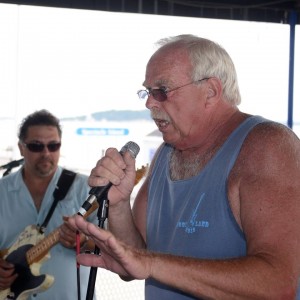 “Financially, I didn’t have enough money to put up $50,000.00 to put on a festival,” he said. “I thought that since the Fair already had all the infrastructure in place, it wasn’t really a stretch to have a blues festival at a country fair. Look at the other fairs around, Fryeburg Fair, Topsfield Far, and Barnstable Fair. All those fairs have country bands and oldies, and it’s the same old thing year after year. They have a country night and an oldies night. I tried to go a lot further than that with an all day music festival.”
“Financially, I didn’t have enough money to put up $50,000.00 to put on a festival,” he said. “I thought that since the Fair already had all the infrastructure in place, it wasn’t really a stretch to have a blues festival at a country fair. Look at the other fairs around, Fryeburg Fair, Topsfield Far, and Barnstable Fair. All those fairs have country bands and oldies, and it’s the same old thing year after year. They have a country night and an oldies night. I tried to go a lot further than that with an all day music festival.”
Hall is also a booking agent for the Ming Dynast in Marshfield as well as Turner’s Yard in Pembroke. His booking career began when the owner of the now defunct Bailey in Marshfield asked for suggestions for a blues night. Hall advised him against a blues jam and regular bands then proposed his “Blues Invitational.”
“I would get five of my friends that I’ve known for years, that are positive and professional, and do an invitational. They come in with a trio, rotate Thursday nights, and have a special guest,” Hall said. “I did it at The Bailey for two and a half years and The Bailey went out of business. I moved it to Turner’s Yard.”
Hall sited the success of The Bailey’s invitational, having brought in artists like Curtis Salgado, Duke Robillard, Sugar Ray Norcia, and many others, with usually no cover charge. As for the Ming Dynasty, he puts bands in on Friday and Saturday nights. Hall just had Joanna Connor in there last Friday night.
Hall got his spot at the Ming after a friend talked to the establishment about him before meeting them personally. He found a good home at the Chinese restaurant and lounge for his blues bands. Hall reported that the Ming just expanded their listening room/lounge area.
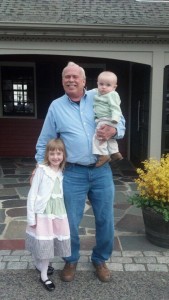 “They tore the walls down and they moved the stage in the back where the wall was,” he said. “It’s all open now. They put a regular stage in, so not everybody has to play on that Karaoke stage any more. It’s really nice. It makes it a big difference. It makes it sound better. We’ve got some good shows coming up.”
“They tore the walls down and they moved the stage in the back where the wall was,” he said. “It’s all open now. They put a regular stage in, so not everybody has to play on that Karaoke stage any more. It’s really nice. It makes it a big difference. It makes it sound better. We’ve got some good shows coming up.”
Hall sold his invitational concept to Turner’s Yard the old fashioned way, by appealing to their business instincts. “I told them I would get in 50 to 80 people on a Thursday night,” he said.
Hall has three requirements for the musicians he brings into a joint. “They have to be professional. They’re popular. They’re talented,” he said. “I don’t like dealing with negative people who come in with attitudes.”
For years, the booker, festival director has been known for his music CD retail business. Hall’s Rhythm Room Records store exists mostly on paper these days. He lost his first store in Plymouth when Kmart and Walmart opened up on roads just down the street from his establishment. “My sales slumped after that,” he said. “When sales slump, the first thing to go is any profit power. All your costs are already there. They’re not going to start getting cheaper because you’re business is slowing down.”
After two years, Hall opened a second store in Marshfield that did well until about 2002 when every teenager and young adult in American purchased computers with CD burners. “Overnight, the sales of my Top 40 and younger generation music plummeted. In one month, those genres, that was my top selling item, overnight, I lost that whole segment. Blues and classic rock started being my biggest sellers.”
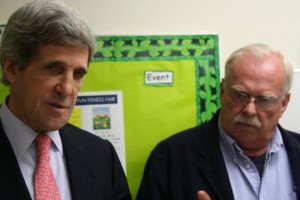 Hall closed the store and returned all of the Top 40, soundtracks, New Age, Jazz CDs but kept his classic rock and blues CDs. He bring his CDs and a banner from Rhythm Room Records to blues festivals and sells from a booth. Hall was making two to three thousand dollars a day when he began. He once made well over eight thousand dollars at a festival in Rhode Island.
Hall closed the store and returned all of the Top 40, soundtracks, New Age, Jazz CDs but kept his classic rock and blues CDs. He bring his CDs and a banner from Rhythm Room Records to blues festivals and sells from a booth. Hall was making two to three thousand dollars a day when he began. He once made well over eight thousand dollars at a festival in Rhode Island.
“I was amazed at how well I did,” he said. “My store, I was struggling to do five hundred dollars. I set up at festivals and I was making three thousand dollars. That’s why I’ve been doing this for the last ten years since I closed the store.” He has kept the name of the store as his business while storing his inventory in his garage. But, he’s finally bringing his CD business to a close.
“This is going to be my last summer selling CDs,” he said. He is also retiring from his job at FedEx next year while ending his second and final term as a selectman in the town of Marshfield. Hall initially had had other plans for his retirement. Once he retired, he was going to bring his inventory by trailer to blues festivals around the country, but the marketplace put a damper on his plan.
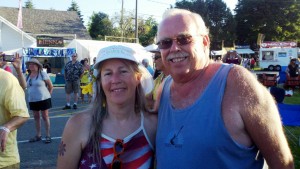 “Unfortunately, CD sales are just getting smaller, smaller, and smaller, weaker and weaker,” he said.
“Unfortunately, CD sales are just getting smaller, smaller, and smaller, weaker and weaker,” he said.
When asked who his personal favorite local artists are, Hall sounded exhausted by the question. “Everybody,” he answered. “I have a collection of 500 hundred local CDs by local bands. Some of my favorites….I don’t know. I listen to so much stuff. My favorite band around is probably Sugar Ray And The Blues Tones. But, I like Diane Blue, Lydia Warren. There’s so many people I really love.”
Hall is not a musician himself, admitting he never had the patience to learn an instrument. “I bought a guitar once. Took a few lessons. That was that,” he said. He doesn’t know why he’s become such a big fan. He just feels it.
When his term as selectman runs out next April, he’ll be out doing more music stuff. He’ll still being running his festivals at the Marshfield Fair, booking venues, and other music matters. “I still get goose bumps when I listen to music that I like. That’s just always what I do. I play football. I was president of Quincy Softball League. I guess I don’t things half way.”

